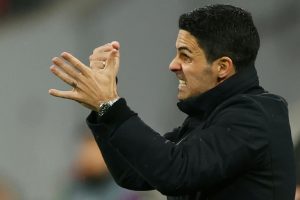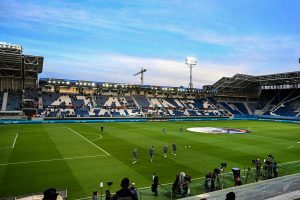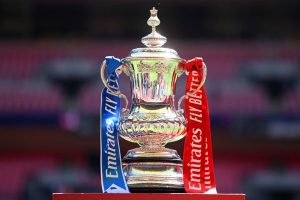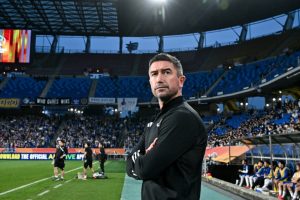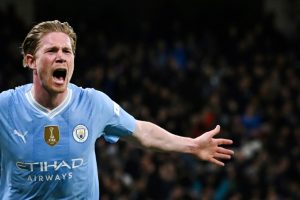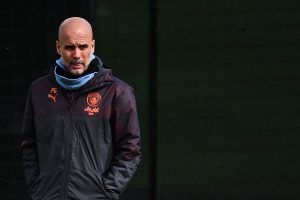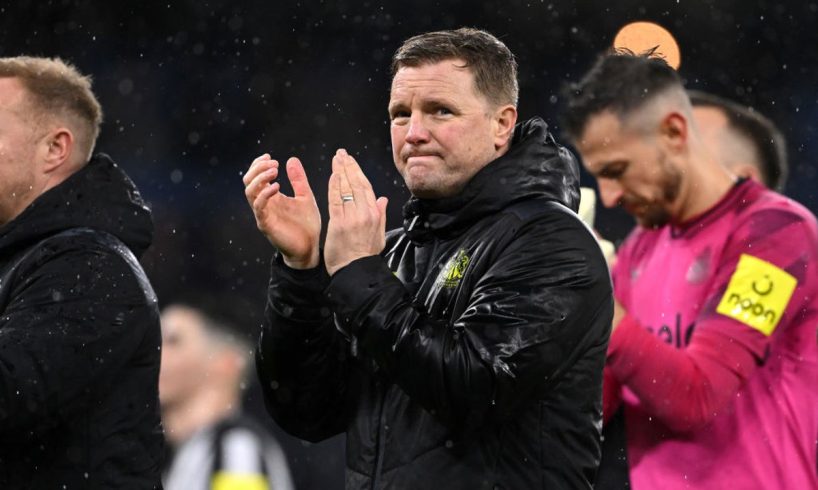
Eddie Howe applauds the Newcastle support after exiting the FA Cup (Getty Images)
Newcastle United have been knocked out of the title race and the contest for the Champions League spots. They have exited the Carabao Cup and the FA Cup. They went out of the Champions League and, in effect, into and out of the Europa League in the same evening. They are 10th in the table, closer in points and position to Bournemouth than Manchester United. “If people say our season is over, that is absolute nonsense,” countered Eddie Howe.
Over? Perhaps not, but it has lost its lustre and much of its meaning. There is still the battle for seventh place, for a Conference League place; perhaps, despite the damage they ultimately did to England’s coefficient, for a Europa League spot. Their finish to this campaign could shape next, Howe argued. There is the question of interpretation, of how their version of second-season syndrome is perceived. Last year was overachievement, this year underachievement. If they had occurred in reverse order, with top-half and a couple of cup quarter-finals followed by top four and a cup final, it may have seemed smooth progress. Now, for a club who had long realised last season may be unrepeatable, merely targeting a top-six spot this year, it is a matter of the level of regression and the consequences.
Some of the mitigation came from Pep Guardiola. “It was the first time they play four competitions and when it is the first time it is not easy for any club,” said the Manchester City manager, after ending Newcastle’s quest for a first FA Cup since 1955. “I am pretty sure they will take lessons from that. The potential is there.”
The added workload felt doubly damaging: given the severity of an injury list that meant that, unlike some of his counterparts at other clubs, Howe was not making excuses when citing the absentees in mitigation; and because it was not just the number of the games but the nature of them. For years, Newcastle had too few big games. Suddenly, they had too many: Carabao Cup ties with City, Manchester United and Chelsea, City again in the FA Cup, European encounters with AC Milan, Paris Saint-Germain and Borussia Dortmund, plus a Premier League fixture list that meant they have played 10 of their ‘big-six’ matches by the middle of March. There has been no respite, no reprieve.
And yet it was a season that began with the brightest of false dawns, the 5-1 demolition of Aston Villa that suggested Newcastle might be the second finest team in the country and Sandro Tonali the signing of the summer. It was an early indication that Newcastle’s peak level remains high. A curiosity of an underwhelming campaign is that their best has still been very good: in home-and-away demolitions of Villa, the evisceration of PSG, the home wins over Arsenal, Chelsea and United.
But, with one exception, those triumphs are all months ago. Since beating United, they are 14th over 14 games, with only Brentford and Sheffield United possessing a worse defensive record. In all competitions, a side who conceded the joint fewest goals in the Premier League last season have let in 40 in their last 20 matches. The numbers are horrific. Newcastle, who were so hard to play against, have been easy opponents at times. They have been the opposite of what they were, of what they want to be.
“This season could have ended up very different,” Howe argued. “The big moments have gone against us.”
Two, in particular, stand out: the contentious injury-time penalty given against Tino Livramento in Paris, perhaps ultimately costing them a place in the last 16 of the Champions League; and the shoulder injury Nick Pope suffered late in the win against United four days later. He has missed those 20 games, which have brought 10 defeats, and an 11th on penalties; others have conceded those 40 goals.
Two injuries have hurt Newcastle still more than all the many others: losing Pope and Joelinton, the sweeper-keeper and shot-stopper and the man whose bruising physicality in midfield meant Newcastle’s identity could be intensity. Now it has not been. They have lost their physical edge, sometimes trying to play last season’s high-tempo football without the same running power and with far more fixtures, sometimes shedding their identity to try a low block or, on Saturday, a back five. There have been games where they have subsided too feebly, matches where they have looked exhausted or demoralised, days when they needed substitutes in midfield or attack had had none to call upon.
Howe and Newcastle have enjoyed highs this year – including the 4-1 win over PSG (Getty Images)
The limitations of individuals, concealed by their momentum and relentlessness last season, have become glaringly apparent. But it remains the case that Howe still often has half-and-half team selections: five or six of his starting 11 predated the takeover and were not bought with added funds. Mentions of ‘the world’s richest club’ have become rarer as PSR constraints have limited their ability to spend.
And Newcastle are paying the price for their first bad transfer window of their new era. Thus far, only Livramento ranks as a success, Lewis Hall, Harvey Barnes and Tonali as failures. So much can come back to the banned Italian: the over-reliance on Bruno Guimaraes, the way Lewis Miley and Sean Longstaff have been overworked, the loss of solidity in midfield. The feeling that, after 18 months of near-flawless dealing, Newcastle’s plans went awry is shown by the reality that Dan Ashworth, who was supposed to oversee their continued rise, is instead of gardening leave while Manchester United pursue him.
Yet if Newcastle are at a crossroads, they have to proceed with Howe. He has support in boardroom and in the stands. He has earned the right to carry on. This year, as he said, had the potential to be very different.
But this year has been worse for him, just as it has been for his players. Anthony Gordon and Jamaal Lascelles have had better seasons this year, but each was a fringe figure before. The newcomers Miley and Livramento have shown promise. But while Alexander Isak has been brilliant at times, Guimaraes classy at points, too few of last season’s regulars have hit the same standards all year: because of injury in the cases of Pope and Joelinton, Joe Willock and Callum Wilson, but Sven Botman has been nowhere near as good since his return from the sidelines, Kieran Trippier had an uncharacteristic run of mistakes, Miguel Almiron’s goals have dried up and the locals Longstaff and Dan Burn, who gave the feelgood factor to a Saudi-owned project, have come in for criticism from their own.
It may underline how unlikely last year was. Yet as Newcastle look to salvage something from this campaign, to get themselves another venture into Europe, some attention shifts to what comes next, to if next season will be more like last season, or this.

